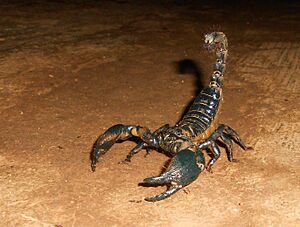Giant forest scorpion facts for kids
Quick facts for kids Gigantometrus swammerdami |
|
|---|---|
 |
|
| A giant forest scorpion from the Western Ghats in Karnataka, India | |
| Scientific classification |
|
| Unrecognized taxon (fix): | Gigantometrus |
| Species: |
Template:Taxonomy/GigantometrusG. swammerdami
|
| Binomial name | |
| Template:Taxonomy/GigantometrusGigantometrus swammerdami (Simon, 1872)
|
|
| Script error: The function "autoWithCaption" does not exist. | |
Script error: No such module "Check for conflicting parameters".
Gigantometrus swammerdami, often called the giant forest scorpion, is a very large scorpion from the family Scorpionidae. It lives in India and is known as the biggest scorpion in the world. It can grow up to 23 cm (9 inches) long. This amazing creature can also weigh about 56 g, which is like a small apple!
What the Giant Forest Scorpion Looks Like
These scorpions have bodies that can be reddish-brown or even reddish-black. Young scorpions, called juveniles, are usually reddish with a yellow tail tip.
They have special comb-like structures called pectinal teeth on their underside. These scorpions have between 16 and 20 of these teeth. Their large pincers, called chela, are very strong and rounded. The main part of their pincer, called the manus, is covered in small, round bumps.
The top shell of their body, called the carapace, is smooth in the middle. However, its edges and back part have a bumpy texture. The tail tip, known as the telson, is rounded. The part of the telson that holds the venom, called the vesicle, is longer than the sharp stinger, which is called the aculeus.
Where the Giant Forest Scorpion Lives and What It Does
The giant forest scorpion's venom is usually not deadly to humans. This is because it has likely developed a different way to catch its food. Instead of relying only on venom, it often uses its powerful pincers to crush its prey.
You can often find these huge scorpions in tropical rainforests. They also live in other places with moderately warm climates.
People have found these scorpions living in interesting spots. They hide inside old or partly damaged termite mounds. They also live in holes in trees and abandoned burrows made by rats or crabs near farm fields. Male scorpions are usually more active during the summer months, from April to July. During this time, you might see them coming out of their dens alone.
See also
 In Spanish: Heterometrus swammerdami para niños
In Spanish: Heterometrus swammerdami para niños

